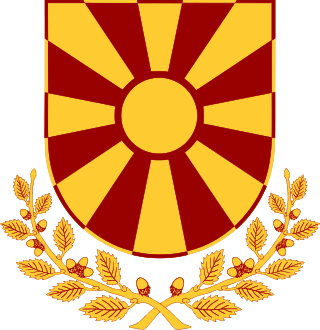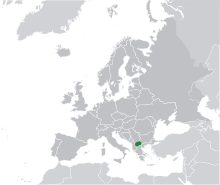Cruel and unusual punishment is a phrase in common law describing punishment that is considered unacceptable due to the suffering, pain, or humiliation it inflicts on the person subjected to the sanction. The precise definition varies by jurisdiction, but typically includes punishments that are arbitrary, unnecessary, or overly severe compared to the crime.

The President of the Republic of North Macedonia is the head of state of North Macedonia.

Capital punishment is a legal penalty in Belarus. At least one execution was carried out in the country in 2022.

The Assembly of the Republic of North Macedonia, or the Sobranie, is the unicameral legislature of North Macedonia. According to the Constitution, the Sobranie represents the people and is vested with legislative power. It can have between 120 and 140 MPs, elected by proportional representation from 6 electoral districts, each contributing 20 MPs, and there are also 3 reserved seats elected from the Macedonian diaspora which are awarded only if the voter turnout was sufficient. MPs are elected for a term of four years and cannot be recalled during their term. The Sobranie is presided over by a President. Its organization and functioning are regulated by the Constitution and Rules of Procedure. The Assembly's seat is in the Sobranie Palace in country's capital Skopje.

Capital punishment for murder was abolished in Cyprus on 15 December 1983. It was abolished for all crimes on 19 April 2002. The death penalty was replaced with life imprisonment. Cyprus is a signatory to the second optional protocol of the International Covenant on Civil and Political Rights, which provides for full abolition of capital punishment. Cyprus initially had a reservation on the second protocol, allowing execution for grave crimes in times of war, but subsequently withdrew this reservation. The Constitution of Cyprus was amended in 2016 to eliminate all forms of capital punishment.
The last execution of a civilian carried out in Albania was a double hanging on June 25, 1992, where brothers Ditbardh and Josef Cuko were hanged in the public square of the southern town of Fier. Capital punishment in Albania was abolished for murder on 1 October 2000, but was still retained for treason and military offences. The reason for the abolition of the death penalty in Albania as well as in other European nations is the signing of Protocol No. 6 to the ECHR.

Capital punishment in Armenia was a method of punishment that was implemented within Armenia's Criminal Code and Constitution until its eventual relinquishment in the 2003 modifications made to the Constitution. Capital punishment's origin in Armenia is unknown, yet it remained present in the Armenia Criminal Code of 1961, which was enforced and applied until 1999. Capital punishment was incorporated into Armenian legislation and effectuated for capital crimes, which were crimes that were classified to be punishable by death, including treason, espionage, first-degree murder, acts of terrorism and grave military crimes.
Capital punishment in Bosnia and Herzegovina is prohibited. It was abolished de facto for all crimes in November 1998 in the Federation of Bosnia and Herzegovina and on June 21, 2000 in the Republika Srpska, the other of Bosnia and Herzegovina's two entities. However, it was only on October 4, 2019 that capital punishment was completely erased from the Constitution of the Republika Srpska. Until then, it was endorsed under Article 11 of the Constitution of the Republika Srpska.

The following outline is provided as an overview of and topical guide to North Macedonia:

Capital punishment in Portugal has been abolished. Portugal was a pioneer in the abolition of capital punishment. No executions have been carried out since 1846, with the formal abolition of capital punishment for civil wrong occurring in 1867.

Capital punishment was used from the creation of the modern Serbian state in 1804. On 26 February 2002, the Serbian Parliament adopted amendments striking it off from the Criminal Code. The last execution, by shooting, took place on 14 February 1992, and the last death sentences were given in 2001. Serbia is bound by the Second Optional Protocol to the International Covenant on Civil and Political Rights, and Protocols No. 6 and No. 13 to the European Convention on Human Rights. According to Article 24 of the Serbian constitution (2006): "Human life is inviolable. There shall be no death penalty in the Republic of Serbia".

The accession of North Macedonia to the European Union has been on the current agenda for future enlargement of the EU since 2005, when it became an official candidate for accession. The Republic of Macedonia submitted its membership application in 2004, thirteen years after its independence from Yugoslavia. It is one of nine current EU candidate countries, together with Albania, Bosnia and Herzegovina, Georgia, Moldova, Montenegro, Serbia, Turkey and Ukraine.

North Macedonia, officially the Republic of North Macedonia, is a landlocked country in Southeast Europe. It shares land borders with Greece to the south, Albania to the west, Bulgaria to the east, Kosovo to the northwest and Serbia to the north. It constitutes approximately the northern third of the larger geographical region of Macedonia. Skopje, the capital and largest city, is home to a quarter of the country's 1.83 million people population. The majority of the residents are ethnic Macedonians, a South Slavic people. Albanians form a significant minority at around 25%, followed by Turks, Roma, Serbs, Bosniaks, Aromanians and a few other minorities.
Capital punishment in Bhutan was abolished on March 20, 2004 and is prohibited under the 2008 Constitution. The prohibition appears among a number of fundamental rights guaranteed by the Constitution; while some fundamental rights—such as voting, land ownership, and equal pay—extend only to Bhutanese citizens, the prohibition on capital punishment applies to all people within the kingdom.

Lesbian, gay, bisexual, and transgender (LGBT) people in North Macedonia face discrimination and some legal and social challenges not experienced by non-LGBT residents. Both male and female same-sex sexual activity have been legal in North Macedonia since 1996, but same-sex couples and households headed by same-sex couples are not eligible for the same legal protections available to opposite-sex married couples.
Capital punishment in Montenegro was first prescribed by law in 1798. It was abolished on 19 June 2002. The last execution, by shooting, took place on 29 January 1981, and the two last death sentences were pronounced on 11 October 2001. Montenegro is bound by the following international conventions prohibiting capital punishment : Second Optional Protocol to the International Covenant on Civil and Political Rights, as well as Protocols No. 6 and No. 13 to the European Convention on Human Rights. Article 26 of the Montenegrin Constitution (2007) that outlawed the death penalty states: "In Montenegro, capital punishment punishment is forbidden”.

The North Macedonia–Taiwan relations refers to the bilateral relations between North Macedonia and Taiwan. Diplomatic relations were established in 1999, but were severed in 2001.
Capital punishment is a legal penalty in Ghana only for high treason. Ghana last executed a criminal in 1993. It is considered "abolitionist in practice." Capital punishment was a mandatory sentence for certain ordinary criminal offenses until 2023.
Events in the year 2022 in North Macedonia.









